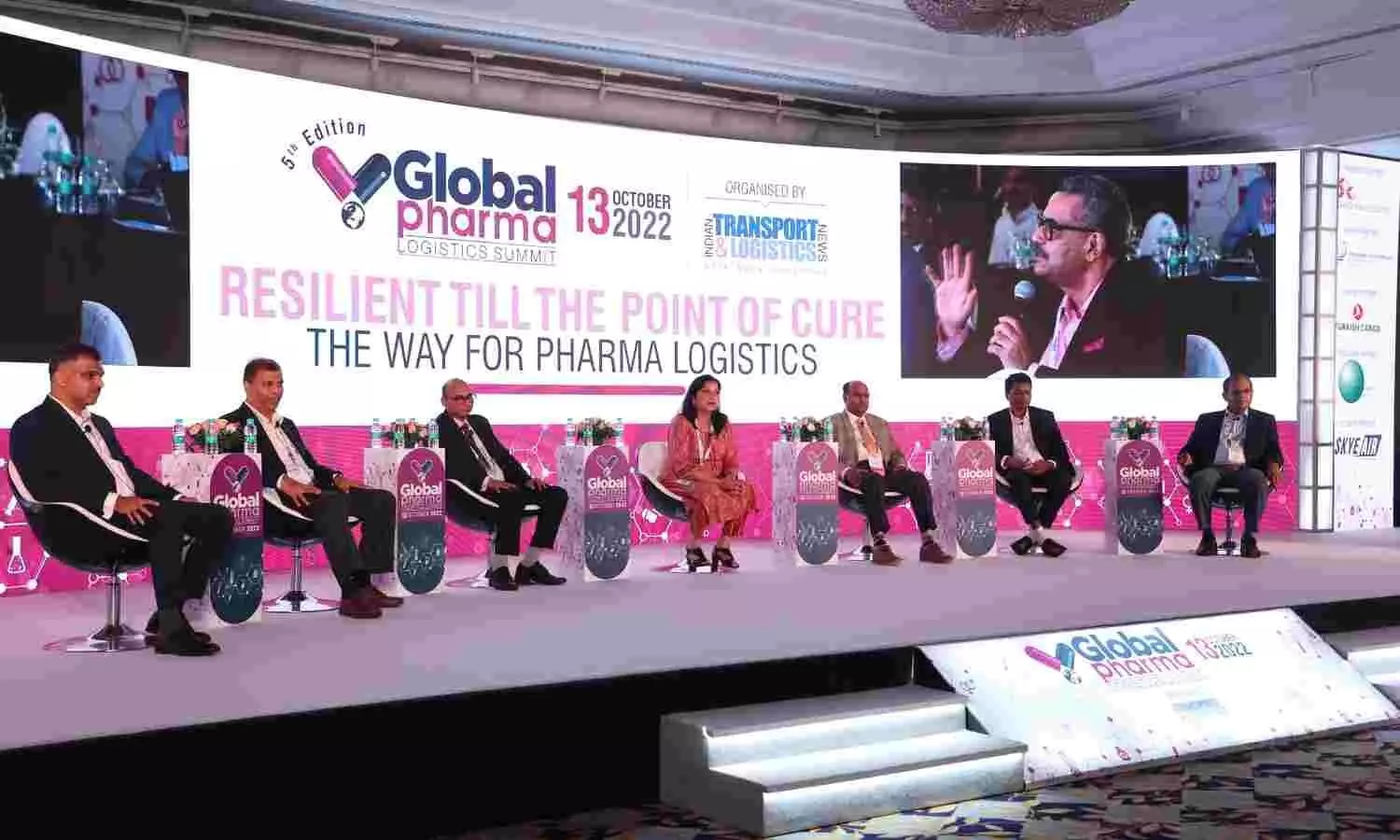
Supply chain system begins with planning: GPLS 2022
Panelists at the fifth edition of the Global Pharma Logistics Summit 2022 highlighted the importance of supply chain planning in making the right decision.

(L - R) Vijay Shetty, Alkem Laboratories, Vilas Rebello, Teva Pharmaceuticals, Avinash Verma, Reliance Retain, Rashmi Karnad, Qatar Airways cargo, Ravi Kumar Tummalapallo, Va-Q-tec, Binu Vijay Kumar, Thermo Fisher Scientific, Ryan Viegas, Pharma & Healthcare Industry
The second half of the Global Pharma Logistics Summit (GPLS) 2022 featured some intriguing discussions regarding supply chain visibility, temperature deviation as a pain point, proper packaging of pharma products, last mile delivery, and more. However, one noteworthy point raised by the panelists was the first and most crucial stage in establishing an effective supply chain system, which is planning.
GPLS 2022 was organised by Indian Transport & Logistics News and presented by Cargo Service Center (CSC) with Mumbai International Airport (CSMIA) as Airport Partner, Turkish Cargo as Airline Partner, Odyssey Logistics as Solutions Partner, Skyways Group as Supply Chain Partner, Skye Air Mobility as Delivery Partner, va-Q-tec and Frankfurt Airport as Supporting Partners and WIZ as the Associate Partner.
Before the two engaging sessions was the relief session featuring two cool and innovative firms that are developing ways to bring relief to healthcare and supply chain pains.
Adarsh Kumar, CEO and Co-Founder, TagBox
TagBox is a cool chain company that has been utilising technology and producing solutions for reliable supply chains all around the world. Adarsh Kumar, CEO and Co-Founder, addressed the company's objective of improving the supply chain and site operations for clients. Kumar discussed his company's previous collaborations with Dr. Reddy's Laboratories for real-time temperature & location monitoring and traceability of the Sputnik V Covid-19 vaccine in India, diagnostics businesses, and others. TagBox's primary focus areas for technological breakthroughs include crucial and sensitive supply chains, as well as improving efficiency and minimising product defects on manufacturing shop floors.
Next up was FreightFox, which was conceived as a tech and services offering to improve Indian industrial logistics. FreightFox's mission is to change the future of freight in India by leveraging technology, data, and efficient ground operations services to challenge the status quo of handling industrial freight and introduce new perspectives that enable efficient, cost-effective, and future-ready logistics operations.
Nitish Rai, CEO and Co-Founder, FreightFox
Nitish Rai, CEO and Co-Founder, took the audience through the company's biography, aspirations, and activities in transportation and logistics. Rai began by outlining the challenges that the transportation and logistics sector faces, as well as what the industry can and cannot handle.
What does FreightFox actually do? They provide their clients the ability to Automate, Augment, and Amplify all on one platform. The company creates segmentation for better freight transportation, and the organisation is incredibly transparent and open in comprehending network behaviour and how it will affect their budget, as well as presenting the company with spending information.
Right packaging solution can solve temperature deviation
The third session focused on the cold chain industry's concerns, the acceptability of phase chain material in packing and shipping, last-mile delivery, and issues that affect the whole supply chain ecosystem, including airlines.
Ryan Viegas, Pharma Consultant from the Pharma & Health business, started the session with a poll for the audience to see what the biggest pain problem is when it comes to exporting temperature-controlled drugs. The audience replied to transit hubs being the highest risk, followed by road transportation to airports.
Villas Rebelo, Head Logistics - India & APAC, Teva Pharmaceuticals provided an example of how they discovered product pain points.
"To determine the pain points of temperature fluctuation, we conducted three dummy product shipments at two-month intervals. We discovered temperature variations during ocean and air freight transportation. People handling the product, as well as transshipments and customs clearance, were major pain points for us."
Ravi Kumar Tummalapalli took the cue from the survey and stressed the kind of packaging solutions that are being used is also one of the issues of product damage.
"If you are using the right packaging solution, be it transit, origin, or destination, you need not worry about product damage. As a supply chain community, we need to take ownership that the product is packed the right way, taken through the lane risk assessment and ensure if there are any risks in the supply chain, then how can we mitigate it."
Binu Vijay Kumar, General Manager of Supply Chain at Thermo Fisher Scientific agreed with Tummalapalli and said that from the diagnostic perspective, in the last few years they are unable to figure out where exactly the material is going wrong.
"The only point we come to know about the product is damaged when it reaches the hospital and finds out the kit is not working when they want to use it. We also tried data loggers but the challenge we have faced is internet connectivity, they are damaged and eventually, we don't get any data."
Storage facility, Data, Visibility
Meeting seasonal demands with limited capacity is difficult. Furthermore, the panelists shed some insight on how companies manage demand and capacity during unexpected scenarios, as pharma products may be required in volume at any moment and from any location.
"Over the years of experience, we have anticipated how the demand is going because of the seasonal requirement and are prepared for even a sudden burst of demand. On the international business side in the U.S, we have an overview of the entire logistics and the temperature to be controlled as we work with the shippers and airlines to gain visibility," said Vijay Shetty, Vice President - Distribution and Logistics, Alkem Laboratories.
"When it comes to the domestic market, I feel many airlines have not seen India as a big cold chain market. In India, the temperature control is not taken that seriously. The distributors are unaware that the cancer products need to be taken in a proper cold chain packaging. We found this out when we did an audit in Teir 2 and Teri 3 cities, many also do not have the capacity to store the products."
Shetty further shared that when demand spikes, they partner with 3PL businesses who have cold storage facilities to hold the demand and refill it to distributors on a time basis.
Talking about the seasonal capacity storage, Rashmi Karnad, Manager Climate Control Product - Pharma, Qatar Airways Cargo said, "Working in the transit movement for the last few years, I have observed some relative stability in terms of volumes compared to 6 to 10 years ago. Many reasons are contributing to this, including increased demand for healthcare items over the previous decade, the affordability of medicines and more. We, as an airline, anticipate that there is some movement of commodities from one part of the world to another throughout the year."
Avinash Verma, General Manager / Lead Cold Chain Pharma Operations, Reliance Retail, was asked what role real-time information and data play in cold chain distribution."From a storage perspective, we are storing at a warehouse, that has a thermal map/ validation to understand the hot spots and cold spots of the warehouse. From a distribution perspective, with the help of technology advancement we use data analytics and based on the analysis decision can be taken and blockchain is also a buzz and a need for an hour as it can give end-to-end visibility."
Following the panel discussion, Abhishek Thakur, Managing Director, Odyssey Logistics was up on the stage to speak too the audience about his company and how the they have worked hard and succeeded with the help of shippers, stakeholders and forwarders.
Abhishek Thakur, Managing Director, Odyssey Logistics
Odyssey Logistics began in 2004 by offering solutions to the automobile industry. They quickly ventured into pharmaceuticals, laying the groundwork for what was to come later for the company. Odyssey has handled all types of major customers in Mumbai and Hyderabad, as well as all types of products, from 2012 till date. This company's USP is winning clients' trust, being truthful, and fostering a sense of belonging. The firm only handles 700 to 1000 tonnes of freight in the US market, with a crew that works 365 days a year.
Planning, challenges and tech
The last panel of this session began with a question about how the planning process of inventory visibility has evolved and what are the current challenges.
To this, Vickram Shrivastava, Head of Planning - Global Supply Chain, Sun Pharma said, "Before Covid-19, supply chain was about logistics and procurement while after the pandemic, I have observed that people are trying to understand the role of planning, that is knitting together the entire information cockpit. Planning plays a very important role in how we will interact with different stakeholders and take the right decisions."
"After experiencing challenges for raw materials during the pandemic as India heavily depends of exports, my vision for inventory has changed from just in time to just in case. This is beyond cost, it is about business continuity plans and also more than business process re-engineering."
Vikas Rajput, Exim Head, Indoco Remedies added, "Inventory management is a company goal that maintains its tracks and inventory while also satisfying the client. Investor visibility is critical, and you must have technology in place to provide visibility of all goods. Pre-pandemic, everything in our company was online, and we recently upgraded to a new version of ERP that gives stakeholders access into the whole supply chain and allows us to perform much better than before."
Talking about the changes in the logistics system, Rajeshwari Nair, Logistics Manager, Zydus, "After covid, the logistical outlook shifted. Things moved quickly before the pandemic, but thereafter, those we believed were the industry's cornerstones vanished. However, others in the industry stepped up to assist with the cargo and the carriers operating the transit. Our firm, Zydus, was the only one that stepped up for the moral cause of providing medications at a low cost."
(L-R) Rajeshwari Nair, Zydus, Surendra Deodhar, Reliance Life Sciences, Vikas Rajput, Indoco, Pramod Pereira, Cargo Service Center, Shrikant Sharda, Skye Air Mobility, Vickram Srivastava, Sun Pharma, Javin Bhinde, Syncore
Surendra Deodhar, Vice President Materials, Reliance Life Sciences said, "Inventory, in my opinion, is one of those aspects that is vital to the body. If something goes wrong, the doctor will be able to figure out what is wrong with your system. Inventory is so important to an organisation that everyone will be evaluating the quality of management, style of operations, and other factors that join together to ensure inventory is suitable. It becomes more intriguing with different dimensions of visibility."
Focusing on the cargo service sector, Pramod Pereira, Assistant General manager, Cargo Service Center talks about how the technology has been used in his organisation and what kind of benefit he observed with the launch of Turant App.
"During covid we had a lot of questions about cargo and planning from truckers, shippers, airlines, this made us thinking that everyone wanted information. Taking all this into account, we created Turant (app) that gives visibility the moment your truck arrives at the terminal from that point till your flight departs. It is a real-time information sharing with airline and makes the cargo move faster," said Pereira.
The conversation then moved to Shrikant Sharda, Director & Co-Founder, Skye Air Mobility to understand how the drones were used during the pandemic to move products. "During the pandemic, Skye Air concentrated on future technology and how we may deliver a disruptive revolution in logistics management with drones. India is the first country to embrace this type of breakthrough technology with the help of the government. We are attempting to develop a parallel ecosystem in the skies for day-to-day requirements using drones."

